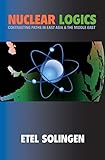Nuclear Logics : Contrasting Paths in East Asia and the Middle East / Etel Solingen.
Material type: TextSeries: Princeton Studies in International History and Politics ; 103Publisher: Princeton, NJ : Princeton University Press, [2009]Copyright date: ©2007Edition: Course BookDescription: 1 online resource (424 p.) : 1 line illusContent type:
TextSeries: Princeton Studies in International History and Politics ; 103Publisher: Princeton, NJ : Princeton University Press, [2009]Copyright date: ©2007Edition: Course BookDescription: 1 online resource (424 p.) : 1 line illusContent type: - 9780691134680
- 9781400828029
- Nuclear nonproliferation -- East Asia
- Nuclear nonproliferation -- Middle East
- Nuclear nonproliferation -- East Asia -- Middle East -- Oost-Azië -- Midden-Oosten -- Naher Osten -- Politik -- Geschichte 1945 ff -- Ostasien -- Politik -- Geschichte 1945 ff -- Ostasien -- Naher Osten
- Nuclear nonproliferation -- East Asia
- Nuclear nonproliferation -- International cooperation
- Nuclear nonproliferation -- Middle East
- Nuclear nonproliferation -- East Asia
- Nuclear nonproliferation -- Middle East
- Nuclear nonproliferation
- Security, International
- POLITICAL SCIENCE / International Relations / Arms Control
- 355.02/17095
- JZ5675 -- .S665 2007eb
- online - DeGruyter
- Issued also in print.
| Item type | Current library | Call number | URL | Status | Notes | Barcode | |
|---|---|---|---|---|---|---|---|
 eBook
eBook
|
Biblioteca "Angelicum" Pont. Univ. S.Tommaso d'Aquino Nuvola online | online - DeGruyter (Browse shelf(Opens below)) | Online access | Not for loan (Accesso limitato) | Accesso per gli utenti autorizzati / Access for authorized users | (dgr)9781400828029 |
Browsing Biblioteca "Angelicum" Pont. Univ. S.Tommaso d'Aquino shelves, Shelving location: Nuvola online Close shelf browser (Hides shelf browser)

|

|

|

|

|

|

|
||
| online - DeGruyter Marking Time : On the Anthropology of the Contemporary / | online - DeGruyter The Other Invisible Hand : Delivering Public Services through Choice and Competition / | online - DeGruyter The Politics of Secularism in International Relations / | online - DeGruyter Nuclear Logics : Contrasting Paths in East Asia and the Middle East / | online - DeGruyter Hindu Nationalism : A Reader / | online - DeGruyter Democratic Breakdown and the Decline of the Russian Military / | online - DeGruyter The Idea of a European Superstate : Public Justification and European Integration - New Edition / |
Frontmatter -- Contents -- Preface -- Part I. Introduction and Conceptual Framework -- Part II. East Asia: Denuclearization as the Norm, Nuclearization as the Anomaly -- Part III. The Middle East: Nuclearization as the Norm, Denuclearization as the Anomaly -- Part IV. Conclusions -- Notes -- References -- Index
restricted access online access with authorization star
http://purl.org/coar/access_right/c_16ec
Nuclear Logics examines why some states seek nuclear weapons while others renounce them. Looking closely at nine cases in East Asia and the Middle East, Etel Solingen finds two distinct regional patterns. In East Asia, the norm since the late 1960s has been to forswear nuclear weapons, and North Korea, which makes no secret of its nuclear ambitions, is the anomaly. In the Middle East the opposite is the case, with Iran, Iraq, Israel, and Libya suspected of pursuing nuclear-weapons capabilities, with Egypt as the anomaly in recent decades. Identifying the domestic conditions underlying these divergent paths, Solingen argues that there are clear differences between states whose leaders advocate integration in the global economy and those that reject it. Among the former are countries like South Korea, Taiwan, and Japan, whose leaders have had stronger incentives to avoid the political, economic, and other costs of acquiring nuclear weapons. The latter, as in most cases in the Middle East, have had stronger incentives to exploit nuclear weapons as tools in nationalist platforms geared to helping their leaders survive in power. Solingen complements her bold argument with other logics explaining nuclear behavior, including security dilemmas, international norms and institutions, and the role of democracy and authoritarianism. Her account charts the most important frontier in understanding nuclear proliferation: grasping the relationship between internal and external political survival. Nuclear Logics is a pioneering book that is certain to provide an invaluable resource for researchers, teachers, and practitioners while reframing the policy debate surrounding nonproliferation.
Issued also in print.
Mode of access: Internet via World Wide Web.
In English.
Description based on online resource; title from PDF title page (publisher's Web site, viewed 30. Aug 2021)


